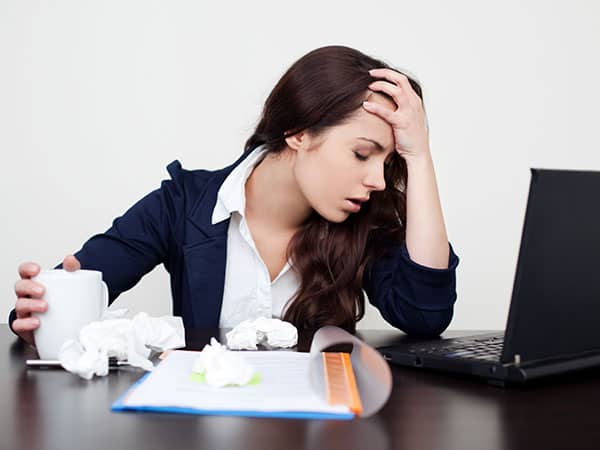
Exercising helps increase white cells in the body said the U.S. National Library of Medicine. “Exercise causes changes in antibodies and white blood cells. These antibodies or white blood cells circulate more rapidly, so they could detect illnesses earlier than they might have before."
Since we know that exercise makes you stronger from the inside out, there might be lingering concerns when you start to get a cough or when the sniffles start. Maybe you've been coasting regarding your exercise regimen and then those sniffles became congestion, so what should you do then? Pushing yourself to go to a spin class or to lift weights while you are sick could do a lot of harm. Certified personal trainer Idalis Velazquez shared with CNN that although sweating it out can help get over being sick quicker, this is not always the case. "Health comes before fitness, and even though we can't control when we get sick, we can do our part in helping our body recover from illnesses," she said. If we are going to help our bodies recover, we need to use discernment. Know when to hit the gym and when to take time off whether you have a stomach bug or a cold with these 6 tips.Change up the routine.If you feel like you are coming down with a cold and feel relatively fine, then go workout. However, if you start overheating and start feeling weak, you need to adjust your routine. Try reducing the intensity in half. You can walk on the treadmill instead of running on it. You can also reduce the number of weights that you are using. "Keep in mind the above-the-neck rule: If your symptoms include a runny nose, dry cough, or sneezing, you should be fine to exercise," Men's Fitness reported. Additionally, if symptoms like congestion become worse, take a break from the gym and do yoga.
Listen to your body.If you have a 24-hour virus and start feeling better--listen to your body if you should start exercising again. Sometimes we can bounce back faster or it may take up to 10 days to feel energized to start exercising again. Raul Seballos, M.D. at the Cleveland Clinic said don't return to the action 100 percent. "If you try to go back too soon, you may just end up prolonging recovery phase," he told Men's Health. "You may also be more short of breath if you're recovering from an upper respiratory infection." If you return too soon you risk getting more sick because your immune system is low.
Avoid exercise with the stomach flu.If you have the norovirus and are vomiting and have diarrhea, do yourself a favor by staying home. With the stomach flu, it is very easy to become dehydrated and sweating will make it worse. Working out when you are dehydrated can elevate the heart. The body needs to work harder when it is dehydrated and sweating makes it worse. When this happens we don’t sweat and the heat remains trapped in the body and it can’t cool off. What happens is that the body begins to overheat, making you feel more rundown. If you feel better, start doing stretches at home and take time off from the gym.
Do not exercise with a fever.Working out with a fever can make you feel even worse. Jut like the stomach bug, you become hydrated with a fever. What is more alarming is a fever over 100 degrees could really deplete the system. Working out with a fever can damage the heart if the fever is ongoing. If it continues to linger above 100 for a few days, you should call a doctor. Furthermore, exercising with a fever can "raise your risk of myocarditis, an inflammation of the heart muscle that may result in heart dysfunction, failure or sudden death," CNN reported. The body at this point is letting you know not to push it. Doing exercises will take what energy you have and leave you even more depleted.
The below the neck rule.The general rule is to monitor symptoms below the neck. If symptoms below the neck include nasal congestion, chest congestion, body aches, fatigue and fever, don't leave for the gym. "A neck check is a way to determine your level of activity during a respiratory illness," Neil Schachter, MD, at Mount Sinai Medical Center in New York explained to WebMD. He advised if you have any tightness in your chest from a cold or from having bronchitis, do not work out. Wait until these systems subside and give yourself time off. Your body will need to recover from these ailments. Rushing things makes it worse.
Use gym etiquette.
Don't be selfish and spread your germs by going to the gym when you are sick. It is bad enough people don't wipe down the equipment when they are done using it. Bacteria loves to be in warm places and if you have a virus, it will spread like wildfire through workout mats, weights and locker rooms. Make sure to bring alcohol wipes and use towels on various surfaces that you use. Wash your hands after you use equipment and carry alcohol-based hand sanitizer with you. While you use gym etiquette for others, make sure to protect yourself from further sickness by wiping equipment down before using it.
We can't always prevent ourselves from getting sick. But when we do, we can pull back from our normal exercise routine. There is no reason to push it if you are sick. The body will tell you whether you should go to the gym or not. Use this as a barometer when it comes to being involved in exercise or not. If you decide to go to the gym, be mindful of others who are not sick, and take it slow.

